Podcast: Play in new window | Download
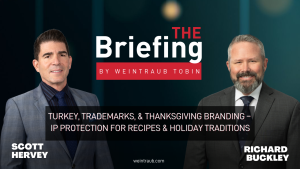 Who really owns your Thanksgiving traditions? In this special holiday edition of The Briefing, Weintraub Tobin partners Scott Hervey and Richard Buckley discuss how intellectual property law intersects with holiday food, recipes, and branding. Continue reading Turkey, Trademarks, and Thanksgiving Branding – IP Protection for Recipes and Holiday Traditions
Who really owns your Thanksgiving traditions? In this special holiday edition of The Briefing, Weintraub Tobin partners Scott Hervey and Richard Buckley discuss how intellectual property law intersects with holiday food, recipes, and branding. Continue reading Turkey, Trademarks, and Thanksgiving Branding – IP Protection for Recipes and Holiday Traditions
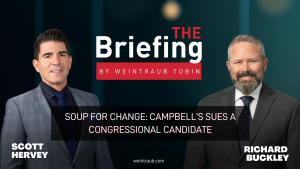 In this episode of The Briefing,
In this episode of The Briefing, 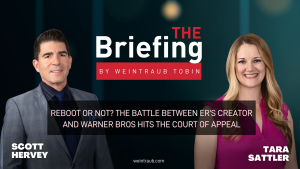 After losing its anti-SLAPP motion, Warner Bros. has appealed in Roadrunner JMTC LLC v. Warner Bros. Television, the lawsuit brought by Michael Crichton’s estate claiming the new series The Pitt is an unauthorized derivative of ER.
After losing its anti-SLAPP motion, Warner Bros. has appealed in Roadrunner JMTC LLC v. Warner Bros. Television, the lawsuit brought by Michael Crichton’s estate claiming the new series The Pitt is an unauthorized derivative of ER.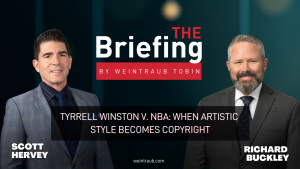 When artistic identity meets corporate branding, where does copyright law draw the line?
When artistic identity meets corporate branding, where does copyright law draw the line?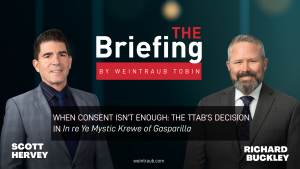 A consent agreement can be a powerful tool to overcome a USPTO likelihood-of-confusion refusal—but only if it’s done right.
In this episode of The Briefing, Weintraub Tobin attorneys
A consent agreement can be a powerful tool to overcome a USPTO likelihood-of-confusion refusal—but only if it’s done right.
In this episode of The Briefing, Weintraub Tobin attorneys 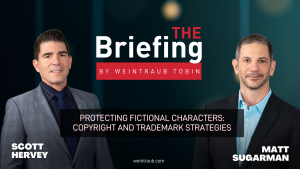 Can a car, a superhero, or even a cartoon sidekick be protected by copyright? In this episode of The Briefing,
Can a car, a superhero, or even a cartoon sidekick be protected by copyright? In this episode of The Briefing, 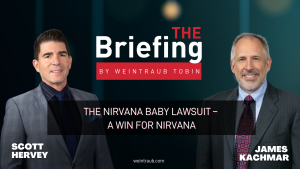 A federal court has granted summary judgment for Nirvana, dismissing Spencer Elden’s claim that the Nevermind album cover — depicting him as a baby — constituted child pornography. In this episode of The Briefing,
A federal court has granted summary judgment for Nirvana, dismissing Spencer Elden’s claim that the Nevermind album cover — depicting him as a baby — constituted child pornography. In this episode of The Briefing, 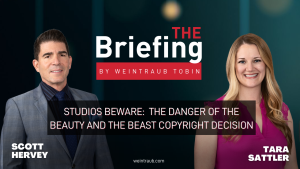 Disney faced a copyright lawsuit over the use of MOVA facial-capture software in Beauty and the Beast. A jury found Disney vicariously liable, the district court threw out the verdict, but the Ninth Circuit has now reinstated it. In this episode of The Briefing,
Disney faced a copyright lawsuit over the use of MOVA facial-capture software in Beauty and the Beast. A jury found Disney vicariously liable, the district court threw out the verdict, but the Ninth Circuit has now reinstated it. In this episode of The Briefing, 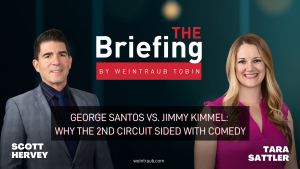 Former Congressman George Santos sued Jimmy Kimmel after the late-night host used Cameo videos in a comedy segment called “Will Santos Say It?” Santos claimed copyright infringement and fraud, but both the District Court and the Second Circuit said Kimmel’s use was fair use. In this episode of The Briefing,
Former Congressman George Santos sued Jimmy Kimmel after the late-night host used Cameo videos in a comedy segment called “Will Santos Say It?” Santos claimed copyright infringement and fraud, but both the District Court and the Second Circuit said Kimmel’s use was fair use. In this episode of The Briefing, 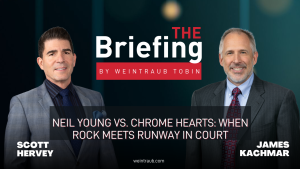 Neil Young vs. Chrome Hearts — What happens when a rock legend collides with a luxury fashion powerhouse? Chrome Hearts has filed suit against Neil Young, claiming his new band “Neil Young and the Chrome Hearts” infringes on their famous trademark
Neil Young vs. Chrome Hearts — What happens when a rock legend collides with a luxury fashion powerhouse? Chrome Hearts has filed suit against Neil Young, claiming his new band “Neil Young and the Chrome Hearts” infringes on their famous trademark